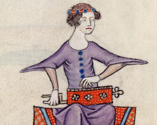Margery Tawney [Tany]
• Offers new interpretation of events at the Tower of London on 14 June 1381
• Shows longer term legacy of the revolt

Margery Tawney, widow, was an eyewitness to the chaotic scenes in London at the height of the revolt on 14 June. Margery herself was not a rebel, but she became caught up in events that day because of a proclamation she heard being read aloud throughout the city, advising anyone with a grievance to take their evidence directly to the king at the Tower of London, where they would receive justice (SC 8/76/3794). Margery and her eldest son, John Thorp duly set off for the Tower, battling through the crowds in an attempt to put their claim before the monarch.
Their grievance centred on unpaid debts they had been owed since the death of Margery’s husband, Thomas Tawney, in 1379 (CPR 1377-81, p. 354). Thomas had been one of the Poor Knights of St George’s College in Windsor Castle. Margery claimed that on his death the Dean of the College, Walter Almaly, withheld the debts owed to her through her husband’s testament. It is possible that Tawney had fallen out of favour before his death; in the winter of 1378 Bishop Adam Houghton had visited St. George’s College and reproached Tawney and other knights saying that these ‘old knights much broken in the wars…keep their adulterate Dalilahs, to the great scandal of the college’ (J.N. Dalton, Statutes and Injunctions of St. George’s Chapel, p. 21).
Margery’s petition suggests that there were chaotic scenes at the Tower on 14th June, as crowds of people responded to the proclamation and attempted to pursue their grievances before the king. Thwarted by the throng of petitioners, Margery failed to hand over her petition. Nevertheless she persisted and presented the document to the king’s Master of the Wardrobe the next day, before the infamous meeting between the king and the rebels at Smithfield (SC8/103/5111).
Initially, Margery’s case met with a positive response: she was awarded repayment of the debts she claimed and Almaly, the Dean of St. George’s Chapel was arrested for obstructing her rights. However, Almaly then retaliated, accusing Margery and her son of being present at the murder of Simon Sudbury, the chancellor, who was dragged to Tower Hill and beheaded by the rebels on 14th June. Margery’s son, John Thorp, was arrested in Southwark by John Chirch, Sergeant of London, and beaten by Almaly ‘on his head and in other parts of his body’. Chirch then took Thorp to Newgate prison, where he died of his injuries. Margery, fearing that her life was in danger, then fled to sanctuary (SC 8/76/3794). At this point Margery had two petitions drafted for her and sent to the king, asking him to order Almaly and Chirch to come before him and testify on oath, so that justice might be done.
Margery’s petitions are particularly significant in the role they ascribe to the judicial aspect of the rising, with the king offering to open up the Tower to hear grievances and dispense justice. In Margery’s version a royal proclamation made on 13th June announced that ‘anyone with an action, title or right to recover any debts or inheritances should come to the King at the Tower of London with their evidence, and justice would be done to them’. Margery claimed that this proclamation was enough to motivate her, and seemingly many others, to risk making the journey to the Tower of London. Her case also shows how perilous this was; her proximity to the group of rebels who beheaded Simon Sudbury left her and her son open to false accusations of involvement in the killing.
Margery’s insistence that petitioners were invited to the Tower contrasts with the version of events given by the chroniclers. The Anonimalle Chronicle has the king and counsellors desperately trying to disperse the rebels from outside the Tower and move them to Mile End, where a set piece meeting then took place between the king and Wat Tyler. It might well be that we need to reappraise the traditional narrative of events on 14 June in light of Margery’s account.
Margery’s petitions highlight the part that women played in the Revolt (until recently an underappreciated facet of the rising). According to her petitions she saw her opportunity to accuse her opponents of misconduct and she was prepared to set out for the Tower despite the danger posed by the insurgents. In the preceding days the commons had laid siege to buildings around the Temple, destroyed the houses of the Hospital of St John of Jerusalem, set fire to buildings in Westminster and Holborn, destroyed the Savoy, opened the Fleet prison and beheaded ‘traitors’ to the king. Margery might not have been aware of the true scale of the devastation in London, but she must surely have had some sense of the risk she took in setting out for the Tower. Margery’s subsequent petitions accentuated her vulnerability; the mention of her status as widow and her dash to sanctuary in fear of her life, but these were carefully crafted documents, intended to elicit sympathy from the men who judged her case.
The outcome of Margery’s case is unknown, but her younger son continued to pursue the two men connected with his brother’s death: in December 1383 Walter Almaly and Richard Metford were named in a trespass case taken out against them by the younger Thorp brother (CCR 1381-85, p. 416).
You can watch a short video discussion of Margery's story by Dr Helen Lacey here:
http://middleagesforeducators.com/teaching-resources/short-video-lectures/new-teaching-resources/
Further Reading:
A. Prescott, ‘‘Great and Horrible Rumour’’: Shaping the English Revolt of 1381’, The Routledge History Handbook of Medieval Revolt, ed. J. Firnhaber-Baker and D. Schoenaers (2016), p. 84.
E.C. Roger, St George’s College, Windsor Castle, in the Late Fifteenth and Early-Sixteenth Centuries, unpublished PhD (University of London, 2015), p. 276.
S. Federico, ‘The Imaginary Society: Women in 1381’, Journal of British Studies, vol. 40, no. 2 (2001), pp. 159-183.
Margery's original petitions are in Fench and you find full transcripts of them in the People of 1381 database. Here are English translations of them:
The National Archives, SC 8/76/3794
To our sweetest Lord the King and to the lords of parliament, Margery who was the wife of Thomas Tady lately knight of the College of Windsor and executrix of the will of the said Thomas shows that on the Thursday of the feast of Corpus Christi in the late insurrection [13 June 1381] a proclamation was made that each person having an action of right to title to recover any debts or inheritances should come to our Lord the King at the Tower of London and show evidences of their right and upon this justice should be done without delay. And upon the said proclamation Margery and John Thorp her oldest son went to present to our Lord the King a bill to recover the debts due to the said Margery by virtue of the will of her said husband and the effect of three judgements given and rendered by three chancellors of our said Lord the King and they could not and did not have occasion to present the same bill but on the day after the Saturday following [sic. The day after was actually Friday 14 June] they gave the same bill to our Lord the King in his wardrobe in London. And that whereas the father in God the Archbishop of Canterbury lately Chancellor of England had judged that party competent to sequestrate all the goods and chattels which belonged to William Mugge then Dean of the said college at present in the hands of Walter Almaly present Dean of the said college ordering the said Walter by letters patent under a certain penalty that no dispersal of the said goods should be made before payment was made to the said Margery of the debts owed by the said William to the said Margery by the aforesaid will. And whereas John de Thorp junior son of Margery [Johan de Thorp filz par issue au dite Margerie] had a certain command by the said Chancellor to summon the said Lord Walter and Lord Richard Metford to appear and respond before the Chancellor, the said Lord Walter arrested the said John Thorp junior [puisne] who had on him the said will and sent him to prison for three days injuriously and in contempt of the King and to delay the process. And further the said Lord Walter arrested the said John de Thorp the eldest son of the said Margery by John Chirche sergeant of London and [took] him to the London compter and thence to Newgate and while John was being arrested the said Lod Walter with great malice assaulted him and hit him on the head and also on other parts of his body by which blows and punishment of his body in prison the said John de Thorp died in the said prison of Newgate in London and sufficient offers were made to the Mayor and Sheriffs of London that is to say William Walworth at that time Mayor of London to mainprise the said John de Thorp body for body to respond according to the common law but nevertheless [he was not] at any time delivered out of prison so that he died. And upon this the said Lord Walter engaged the said [John Chirche] to take and destroy her body as he had destroyed her younger son so that she remains in sanctuary to great mischief and nuisance for fear of death. May it please your most gracious Lord to make the parties appear before your most noble presence and likewise the said John Chirche sergeant to speak and confess by his oath and on the evidence that you lords prepare by due examination make justice and right to the parties without delay by God and as a work of charity.
The National Archives, SC 8/103/5111
To our gracious Lord the King of Castile and Leon and Duke of Lancaster, Margery who was the wife of Thomas Tany lately knight of the college of Windsor shows that whereas on Thursday before [sic] the feast of Corpus Christi last [13 June 1381, but this was actually the feast of Corpus Christi] a public proclamation [proclamacion overte] was made that all manner of people who had grievances to pursue should come before the King our Lord staying in the Tower of London and show their evidences and right and justice would be administered to the parties. And on Friday following [14 June 1381] the said Margery and John de Thorp his son in response to the said proclamation came to the Tower of London with a bill to show to our Lord the King and to have the recovery of certain debts due to the said Margery by virtue of the will of our husband and it was not possible for Margery to have an opportunity to present her bill. And on the next day [15 June 1381] the said Margery gave her said bill to the King our Lord in his wardrobe at London which debts were adjudged to Margery by due process made and determined before three Chancellors of our Lord the King and given by them in three judgements. And that our father in God the Archbishop of Canterbury lately Chancellor of England sequestrated all the goods which were of Lord William Mugge then dean of the college of Windsor remaining in the hands of Lord Walter Almaly presently dean of the same college, commanding that no disbursement should be made before the said Margery had the restitution and payment of the debts due to the said Margery by virtue of the said will. And because John Thorp the younger son of the said Margery [filtz au dite Margerie puisne] bore the order of the said Chancellor to summon the said Lord Walter Almaly et Lord Richard Metford to appear before him and respond to certain points contained in the said order, the said Lords Walter and Richard arrested the said John carrying the order with him and imprisoned him for three days in contempt of the King and disturbance of the right of the said Margery. And moreover the said Lord Walter with great malice falsely suggested against the said Margery and John Thorp her elder son that they were at the Tower of London among those who put the said Chancellor to death, although Margery and John were guilty of nothing as they are prepared to show by all the good people of Southwark and others knowing the full truth. By force of this false suggestion the said Lord Walter had the said John Thorp the elder son of the said Margery arrested in Southwark by John Church sergeant of London and moreover the said Lord Walter at the same time that the said John was placed under arrest hit the said John Thorp on his head and struck him in other parts of his body and would have killed him if the said John Church had not aided and rescued him and upon this he was taken to the prison of Newgate and detained there until the said John Thorp by mischief and physical suffering was dead and the said Lord Walter Almady would not permit the said John Thorp to any mainprise as was often offered to the sufficient and respectable people of London body for body. And since the said Lord Walter has engaged to destroy the said Margery as he has destroyed her son and has procured an inquest to acquit the said Walter of these falsehoods and injuries, may it please your most gracious Lordship that the said John Church should come before the council of our Lord the King and confess the truth and ordain a remedy for these horrible falsehoods and injuries for God and the service of charity.






